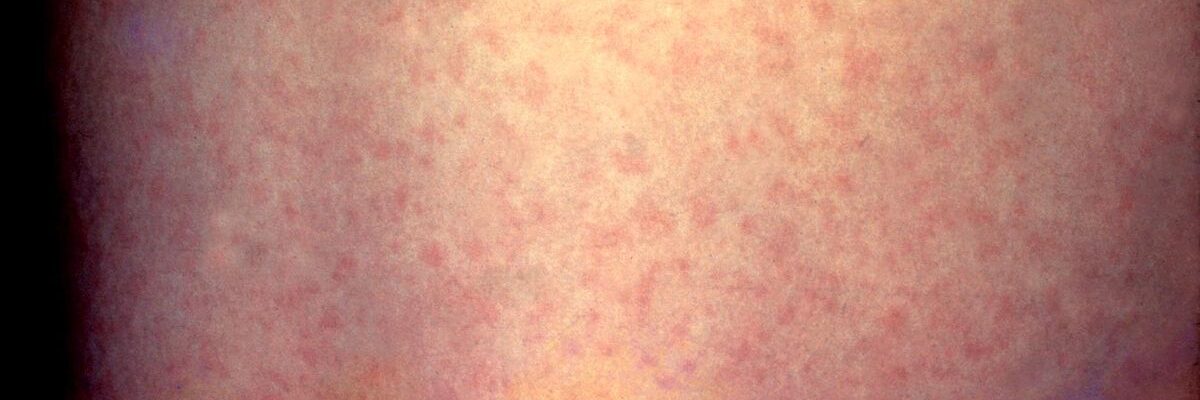Overview
German measles, or rubella, is a contagious viral infection primarily known for its characteristic red rash. It is caused by the rubella virus and spreads through respiratory droplets from coughs or sneezes of an infected person. While it is generally mild in children, the infection can have serious implications for pregnant women, as it poses a risk to the developing fetus, potentially causing congenital rubella syndrome (CRS).
The symptoms of German measles typically appear two to three weeks after exposure to the virus. Common signs include a low-grade fever, swollen lymph nodes, and a fine pink or red rash that starts on the face and spreads to the rest of the body. In some cases, adults may experience joint pain or inflammation as an additional symptom. For many individuals, the infection may go unnoticed due to its mild presentation, particularly in children.
Treatment for German measles focuses on relieving symptoms, as the virus usually resolves on its own within a week. Rest, hydration, and over-the-counter medications like acetaminophen can help manage fever and discomfort. Since there is no specific antiviral treatment for rubella, prevention through vaccination is the most effective approach. The measles, mumps, and rubella (MMR) vaccine provides lifelong immunity for most individuals when administered in childhood.
Although German measles is now rare in many parts of the world due to widespread vaccination, outbreaks can still occur in communities with low immunization rates. Pregnant women who contract the virus are at high risk for serious complications, emphasizing the importance of immunization programs and public health efforts to eliminate rubella transmission.
Table of Contents
When to See a Doctor
While German measles is generally a mild illness, there are specific situations where consulting a medical professional is essential. Seeking timely advice can help manage symptoms, prevent complications, and protect others from infection.

Signs to see a doctor:
- Pregnancy or suspected pregnancy during exposure. If a pregnant woman is exposed to rubella or develops symptoms, immediate medical attention is crucial. Rubella during pregnancy can cause congenital rubella syndrome (CRS), leading to severe birth defects or miscarriage.
- Severe or prolonged symptoms. While rubella typically resolves on its own, persistent high fever, severe rash, or other complications like joint pain should be evaluated by a doctor to rule out secondary infections or other illnesses.
- Outbreaks in unvaccinated communities. If you or your child have not been vaccinated and have been in contact with someone diagnosed with German measles, consulting a healthcare provider is essential to determine your risk and consider post-exposure prophylaxis.
- Uncertainty about immunity. Individuals unsure of their vaccination status or immunity, especially those planning to travel to areas with known outbreaks, should consult a doctor for testing or vaccination recommendations.
Early medical intervention can help manage rubella effectively, protect vulnerable populations, and prevent its spread. Promptly addressing concerns with a healthcare provider ensures the best outcomes for both individuals and the community.
What Type of Doctor to Seek
If you suspect you or someone in your family has German measles, the best type of doctor to consult initially is a general practitioner (GP) or a pediatrician for children. These primary care physicians are equipped to diagnose and manage rubella based on symptoms, medical history, and, if necessary, laboratory tests like a rubella-specific antibody test. They can also provide guidance on symptom relief and preventive measures to reduce the risk of spreading the infection.
In certain cases, especially if complications arise or the patient is pregnant, a specialist may be involved. Pregnant women exposed to rubella should immediately consult an obstetrician or a maternal-fetal medicine specialist. These doctors can monitor the health of both the mother and the fetus, assess the risk of congenital rubella syndrome, and recommend appropriate follow-up care. For individuals with severe symptoms or underlying health conditions, an infectious disease specialist may be consulted to address complex cases.
What to Expect from Your Visit to a Doctor
When visiting a doctor for suspected German measles, the consultation will typically begin with a review of your medical history and vaccination status. The doctor will ask about recent symptoms, such as fever, rash, and swollen lymph nodes, as well as any known exposure to someone with rubella. For women of childbearing age, the doctor will also inquire about pregnancy or the possibility of being pregnant. A physical examination will follow, focusing on the characteristic rash and other signs like swollen lymph nodes behind the ears and at the back of the neck.
If rubella is suspected, the doctor may order a blood test to confirm the diagnosis. This test checks for rubella-specific antibodies, which indicate recent or past infection. For pregnant women, additional tests like ultrasound may be recommended to assess the health of the fetus if there’s a risk of congenital rubella syndrome. Based on the findings, the doctor will provide guidance on managing symptoms, preventing spread to others, and, if necessary, coordinating further care with specialists.
German Measles Treatment Options
German measles, or rubella, typically lasts for about three days and often resolves on its own. The symptoms are usually mild, especially for healthy children and adults. While there is no specific antiviral treatment, supportive care and lifestyle measures can help alleviate discomfort and speed up recovery. Below are treatment options and home remedies often recommended for managing rubella symptoms:
- Fever-reducing medications. Medications like paracetamol or acetaminophen can help lower fever and relieve discomfort. Avoid giving aspirin, especially to children, as it may cause serious complications like Reye’s syndrome.
- Headache relief. The same medications used for fever can also address headaches and body aches due to their analgesic properties, providing overall relief.
- Antihistamines for itching. To reduce itching caused by the rash, antihistamines like oral tablets or calamine lotion can be used. Calamine lotion, applied directly to the skin, provides a cooling and soothing effect.
- Intravenous fluids. In severe cases, such as when dehydration occurs due to fever and rapid breathing, the patient may require IV fluids in a hospital setting to maintain hydration and support recovery.
- Hyperimmune globulin treatment. For pregnant women exposed to rubella, hyperimmune globulin injections can help reduce the risk of complications and protect the fetus. These injections strengthen the immune system’s ability to combat the virus.

In addition to medical treatments, several home remedies and lifestyle adjustments can support recovery:
- Hydration with water. Drink 1.5 to 2 liters of water daily to prevent dehydration and alleviate symptoms like cough and congestion.
- Herbal teas. Warm teas made from herbs like lagundi, oregano, or ginger can soothe cough and congestion. Fresh calamansi juice is also a beneficial option.
- Watery fruits and vegetables. Include hydrating foods like watermelon, grapes, melon, tomatoes, and celery in the diet to boost hydration and nutrition.
- Vitamin C-rich foods. Foods high in vitamin C, such as oranges, lemons, papaya, broccoli, and berries, help strengthen the immune system and fight infections.
- Warm water baths. Bathing in warm water can reduce itching and soothe irritated skin. If bathing is not feasible due to high fever, gently wiping the skin with a warm, damp cloth is an effective alternative.
- Comfortable clothing. Wear loose and breathable clothes to keep the body cool and reduce skin irritation caused by sweating.
- Adequate rest. Sleeping for 8–10 hours a night allows the body to produce cytokines, proteins that help combat viruses and promote faster recovery.
While recovering, patients should remain isolated to prevent spreading the infection, as rubella is highly contagious. Pregnant women, infants, and individuals with weakened immune systems are especially vulnerable and should consult a doctor immediately if exposed. With proper care and attention, most cases of German measles resolve without complications.
German Measles Prognosis
The prognosis for German measles is generally excellent, especially with timely supportive care and symptom management. Most individuals recover fully within a few days to a week without long-term complications. Below is an overview of what to expect from each treatment option:
- Fever-reducing medications. Medications like paracetamol or acetaminophen effectively lower fever and alleviate discomfort. Symptoms related to fever usually subside within 1–2 days of treatment.
- Headache relief. Analgesics provide quick relief from headaches and body aches, often within a few hours of administration, helping the patient feel more comfortable.
- Antihistamines for itching. Antihistamines and calamine lotion quickly reduce itching and skin irritation, with noticeable improvement typically within a day of use.
- Intravenous fluids. For severe cases involving dehydration, IV fluids rapidly restore hydration, with patients often showing improvement within hours.
- Hyperimmune globulin treatment. For pregnant women, this treatment significantly reduces the risk of complications like congenital rubella syndrome, although close monitoring remains essential.
With appropriate treatment and care, most patients experience a smooth recovery. Severe complications are rare and usually limited to high-risk groups, such as pregnant women and individuals with weakened immune systems. Following medical advice and practicing good hygiene during recovery can ensure the best outcomes and prevent further spread of the infection.


